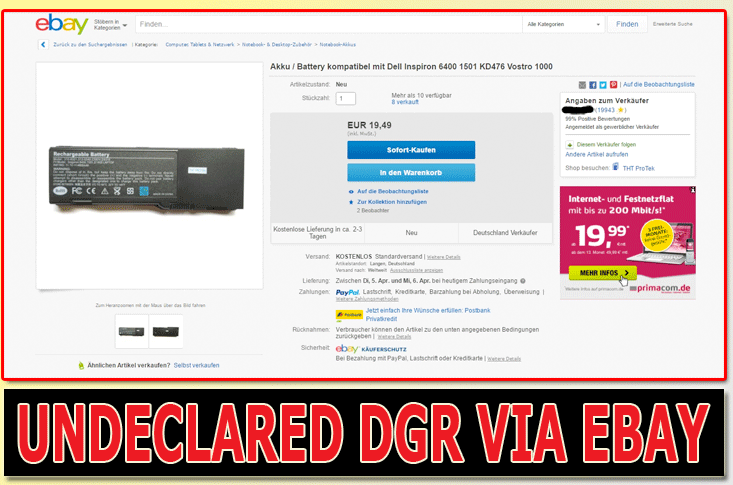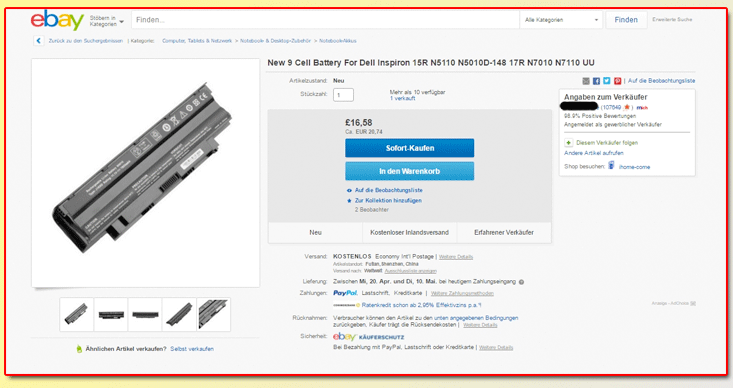
Internet auction platforms
certainly have changed the way we live, value things,
and sometimes even how we make a living.
Instead of letting that
old laptop or cellphone gather dust, you sell it on
e-Bay. And when you need a spare part for your 1950’s
to 1980’s collectible car, chances are it can
be found for less on e-Bay or some other auction platform—hence
the e-Bay slogan, “if it exists in the world,
in can probably be found on e-Bay.
For many people, e-Bay
is a part of their daily life, generating additional
income from selling and cutting down on expenses by
buying for cheaper via the global village store.
There is, of course, nothing
wrong with that, quite the contrary.
Truth be told, e-Bay has
also done an admirable job of rooting out sales of counterfeit
brand items, pirated software, and illicit goods, like
products made from protected species (such as ivory
or some fur coats), weaponry, explosives, and other
merchandise that require strict controls.
Here’s
The DGR Rub
There seems to be one
problem auction platforms such as e-Bay may have overlooked:
The simple fact that many
articles and substances in daily use fall under the
Dangerous Goods Regulations/Hazardous Materials Regulations
and may not be shipped without proper training, packing,
marking, labeling, and documentation.
In particular, it should
be noted that by law international mail allows almost
no Dangerous Goods shipments (with the exception of
certain diagnostic specimens either classified as UN
3373, Biological Substance Category B, or Exempt Human/Animal
Specimen, Dry Ice as a coolant for UN 3373, certain
so-called “Excepted Radioactive Packages”
with extremely low limits [Certain smoke detectors fall
under that classification] and, only where so authorized
by the Civil Aviation Authority of the departure state,
“small” Lithium metal batteries [containing
2g of aggregate Lithium or less] or Lithium-Ion batteries
[100 Wh or less].)
These small batteries
are never permitted in airmail shipments unless installed
in equipment, e.g. a laptop or tablet computer with
a battery installed.
And while e-Bay offers
plenty of information regarding the “e-Bay code
of conduct” with the dos and don’ts for
both sellers and buyers, including the regulations applicable
to certain merchandise and unwanted or illegal practices,
the one issue that gets little to no coverage is the
ever pressing topic of dangerous goods.

DGR
In The Mails Actioned
In a notable joint effort
of the very proactive HKG CAA, Hong Kong has created
an outreach to local forwarders and GHAs. It follows
that carriers including CX have seriously minimized
movement of undeclared DG in airmail and cargo as well
as in baggage carried by some merchants to neighboring
countries.
Also in the UK, strict
application of the regulations and a trained workforce
of the UK Royal Mail (which permits certain “consumer
commodities” in domestic mail) have considerably
reduced the problem of undeclared DG in mail and courier
services.
Gefahrgut
Lost In Translation
While it is true that
China and Hong Kong sellers are much less omnipresent
on e-Bay with offers to ship cheap, undeclared DG anywhere,
Germany still seems to be a safe haven for anything
not in compliance.
We found a used steering
wheel with airbag for 85 Euros (US $96.81) plus 6.90
Euros (US $7.89) offered with shipping by DHL Small
parcel.
There is no indication
that the 6.90 Euro shipping price includes approved
packaging for Class 1 explosives, which is what an airbag
contains. While it is true that most airbags can be
reclassified to Class 9, that reclassification would
require such packaging to withstand the so-called bonfire
test, which realistically, in this price range, is highly
unlikely.
Lithium Ion batteries
of any kind—for laptops, cellphones, remote controls—are
also available for much less on e-Bay than in brick-and-mortar
stores.
The German seller “handywest”
has 153,640 transactions and offers free shipping by
Deutsche Post. “Elektrocell-com” from Vienna
also ships for free by Deutsche Post, as does seller
“mobilschleuder,” who is offering a Li-Ion
battery for Samsung Note III said to be “Original”—for
9.99 Euro (US $11.38). The same battery sells on the
German Samsung website for 29.90 Euros. A non-representative
test purchase of 12 aftermarket batteries for the Samsung
Galaxy 4 by the German computer magazine c’t in 2015 yielded that 12 out of 12 batteries were fake
and thus never underwent the required safety testing.
E-Bay’s website
has plenty of information about shipping. But to make
the point again, the term “Gefahrgut”—German
for “Dangerous Goods”—is nowhere to
be found.
And one thing you will
not find in any German post office is posters or fliers
informing the public about the hazards of shipping DG
by mail—quite understandable, since none of the
staff has been trained in recognition and handling of
undeclared DG.
As mentioned earlier,
e-Bay has been quite proactive to find—and eliminate—auctions
with pirated software, Lacoste polo shirts for 3.00
Euros and Louis Vuitton handbags for 25.90 Euros have
been eliminated. Undeclared Dangerous Goods seem to
be not on their radar.
All
Talk?
While the talk at this
year’s IATA WCS centered on willful, non-compliant
shippers, the risk their goods mean to air transport,
and how to identify and eventually prosecute them, here
is an exercise that should help illustrate the scope
of the DG challenge:
Just go to www.ebay.de,
and surf the site.
Your move.
H. Amburger
|





 Vol
15. No. 39
Vol
15. No. 39